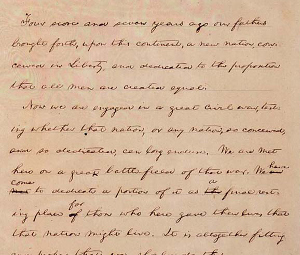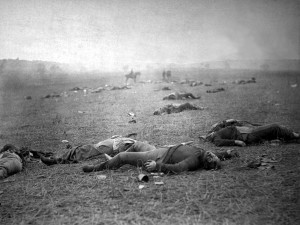What does the Gettysburg Address tell us about the North and slavery?
Posted November 20th, 2013 by James DeWolf PerryCategory: History Tags: Abraham Lincoln, Battle of Gettysburg, Emancipation Proclamation, Emancipation to Equality, Gettysburg Address, Northern complicity, Sesquicentennial of the U.S. Civil War
 Now that much of the hullabaloo surrounding the 150th anniversary of the Gettysburg Address has died down, perhaps we can finally ask ourselves: what really was the enduring significance of Lincoln’s famous oration?
Now that much of the hullabaloo surrounding the 150th anniversary of the Gettysburg Address has died down, perhaps we can finally ask ourselves: what really was the enduring significance of Lincoln’s famous oration?
Lincoln’s remarks at Gettysburg were, of course, masterful. In just a few short sentences, the wartime president managed to eulogize the dead and to craft a narrative within which the nation could commemorate their sacrifice, and remember the war, in the context of broad themes from nation’s history and its future aspirations. His address even redefined the nature of public speeches in the United States, breaking ranks with generations of orations based on classical history, learned language, and the passage of hours.
Yet the historical significance of the Gettysburg Address lies primarily in Lincoln’s effort to shift the North’s motivation for fighting the conflict from the preservation of the Union to the radical, and largely detested, goal of emancipation for the nation’s 4 million remaining enslaved persons.



 What, to the slave and to free blacks, was the Battle of Gettysburg? ((The title and first line of this essay are a paraphrasing of Frederick Douglass’ famous line, “What, to the American slave, is your Fourth of July?”, in his 1852 July 4th address, “The Meaning of July Fourth for the Negro,” in Rochester, N.Y.))
What, to the slave and to free blacks, was the Battle of Gettysburg? ((The title and first line of this essay are a paraphrasing of Frederick Douglass’ famous line, “What, to the American slave, is your Fourth of July?”, in his 1852 July 4th address, “The Meaning of July Fourth for the Negro,” in Rochester, N.Y.))